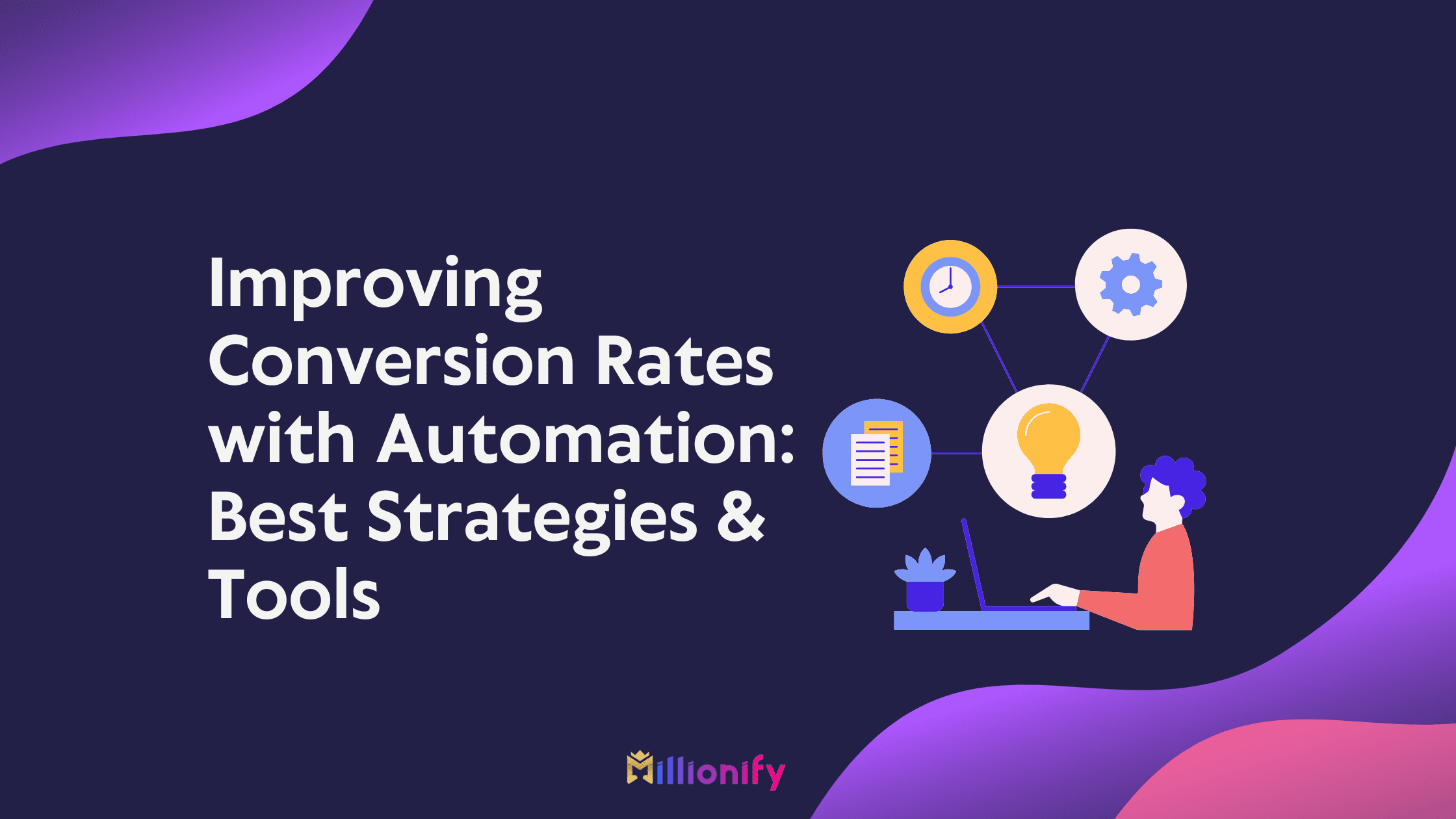Automation has completely changed the way businesses approach marketing and sales. Whether you’re running an online store, a SaaS business, or a local service, automation can help you turn more visitors into paying customers—without working 24/7. But how do you actually improve conversion rates with automation? What are the tools and strategies that really work?
Let’s dive deep into how automation can boost conversions, explore actionable strategies, and check out some of the best tools to put everything on autopilot—without losing the human touch.
What Does Improving Conversion Rates with Automation Mean?
Before jumping into the how, let’s get clear on the what.
Conversion rate is simply the percentage of your website visitors or leads who take a desired action—like making a purchase, filling out a form, booking a call, or signing up for a free trial.
Automation, on the other hand, refers to using software to handle repetitive tasks—automatically.
When you combine the two, automation tools help guide prospects smoothly through your sales funnel, increasing the chances that they’ll convert into customers—with little to no manual effort.
Why Should You Care About Automating Conversions?
Think about this: How much time are you spending on follow-ups, emails, reminders, and lead nurturing? Now, imagine if that was all done for you—instantly and perfectly timed.
Here are a few reasons why automating conversion tasks is a game-changer:
- Save time for what actually matters—like strategy and creative work.
- Consistent follow-ups that you won’t forget.
- Personalized experiences at scale.
- Faster responses, leading to higher customer satisfaction.
- Higher conversion rates (because timing and personalization are everything).
Did you know? According to Epsilon, 80% of consumers are more likely to make a purchase when brands offer personalized experiences.
Top Strategies to Improve Conversion Rates with Automation
1. Personalized Email Automation
Generic emails don’t cut it anymore. People want personalized and relevant messages. With automation, you can send targeted emails based on user behavior.
How to Use Email Automation:
- Welcome series when someone signs up.
- Cart abandonment emails for shoppers who leave without buying.
- Product recommendations based on browsing history.
- Re-engagement campaigns for inactive users.
Tip: Tools like ActiveCampaign, Klaviyo, and ConvertKit excel at behavior-triggered emails.
2. Lead Scoring and Segmentation
Not every lead is ready to buy. Lead scoring helps identify which leads are hot and which need nurturing.
How Lead Scoring Helps:
- Assign scores based on actions (email opens, clicks, site visits).
- Segment users based on scores for targeted follow-ups.
- Pass high-scoring leads to sales teams.
Example: If a lead downloads multiple resources and visits pricing pages, you can automatically move them to a “hot lead” segment and start personalized outreach.
3. Chatbots and AI-Powered Live Chat
Customers love quick answers. Chatbots can engage visitors in real-time, answer FAQs, and collect contact info for follow-ups.
Benefits of Chatbots:
- Instant support 24/7.
- Collect emails and phone numbers.
- Recommend products/services based on answers.
- Pre-qualify leads for your sales team.
Best Tools: Drift, ManyChat, Tidio, Intercom.
4. Dynamic Content Personalization
Imagine if your website changed dynamically based on who’s visiting—first-time visitor vs. returning customer. That’s possible with automation-driven personalization.
Examples of Dynamic Content:
- Personalized greetings (Hi John! Welcome back!).
- Showing relevant products/services based on location.
- Exclusive discounts for returning visitors.
Tool tip: Use Optimizely, Dynamic Yield, or RightMessage to personalize user experiences.
5. Automated SMS and Push Notifications
Emails can get buried. SMS and push notifications are direct and have higher open rates.
Best Uses:
- Remind users about abandoned carts.
- Offer limited-time discounts.
- Notify about events or product restocks.
Fact: SMS messages boast a 98% open rate, compared to email’s 20%.
6. Automated Scheduling for Calls/Demos
If you rely on calls or demos to close sales, automate the booking process.
Tools You Can Use:
- Calendly, Chili Piper, and YouCanBookMe let leads book slots without back-and-forth emails.
- Automatically send reminders so they don’t miss it.
- Follow up post-call with personalized emails—automated, of course!
7. Review & Testimonial Collection Automation
Social proof boosts conversions. Automate review requests post-purchase or post-service.
Automation Ideas:
- Send a review request 3 days after product delivery.
- Offer a discount on next purchase for leaving a review.
- Feature reviews dynamically on product pages.
Top Tools: Loox, Yotpo, Trustpilot, Stamped.io.
Best Tools to Boost Conversion Rates with Automation
| Tool Name | Best For | Key Features |
|---|---|---|
| ActiveCampaign | Email Marketing & CRM | Email flows, lead scoring, site tracking |
| HubSpot | All-in-one CRM & Marketing | CRM, email, lead nurturing, workflows |
| OptinMonster | Lead Capture & Popups | Exit-intent popups, A/B testing, personalized offers |
| Klaviyo | Ecommerce Email & SMS | Cart recovery, product recommendations, SMS |
| Drift | AI Chatbot & Conversational Marketing | Live chat, lead qualification, meeting scheduling |
| Zapier | Workflow Automation | Connects 5000+ apps, custom workflows |
| Calendly | Appointment Scheduling | Meeting scheduling, reminders, integrations |
Stats That Prove Automation Works
- 53% of marketers say continued personalization improves conversion rates. (Source: HubSpot)
- 80% of companies using marketing automation see increased lead generation. (Invesp)
- Automated emails generate 320% more revenue than non-automated ones. (Campaign Monitor)
- 82% of consumers expect an immediate response from businesses. (Salesforce)
Common Mistakes to Avoid When Using Automation
- Being too robotic: Make sure your messages sound human.
- Over-automating: Don’t spam your audience. Set proper frequency caps.
- Ignoring segmentation: Not every customer is the same—target them accordingly.
- Not tracking results: Use analytics to know what’s working and what’s not.
- No human fallback: Sometimes people want to talk to a real person—have that option available!
How to Get Started: A Quick Roadmap
- Audit your customer journey – Where are you losing potential customers?
- Identify tasks to automate – Emails, lead capture, follow-ups.
- Pick your tools – Based on your business size and needs.
- Create workflows – Map out automation steps clearly.
- Test & optimize – Review results and adjust.
- Add a human touch – Blend automation with real conversations.
Conclusion
Improving conversion rates with automation isn’t just about saving time—it’s about creating a seamless experience that makes people say “yes” to your offers. When done right, automation feels personal, timely, and helpful—never spammy. Start small, pick the right tools, and focus on your customer’s journey. Remember, automation should amplify your efforts, not replace real connections. Ready to take your conversions to the next level? It’s time to automate smartly!
FAQs
1. What is the first thing I should automate to improve conversion rates?
Start with email automation—especially abandoned cart emails and welcome sequences. These bring quick wins and are easy to set up.
2. Are chatbots effective for small businesses?
Absolutely! Chatbots help answer questions, capture leads, and book appointments—all while you focus on growing your business.
3. How do I avoid sounding robotic when using automation?
Write in a conversational tone, add the recipient’s name, and personalize based on behavior.



